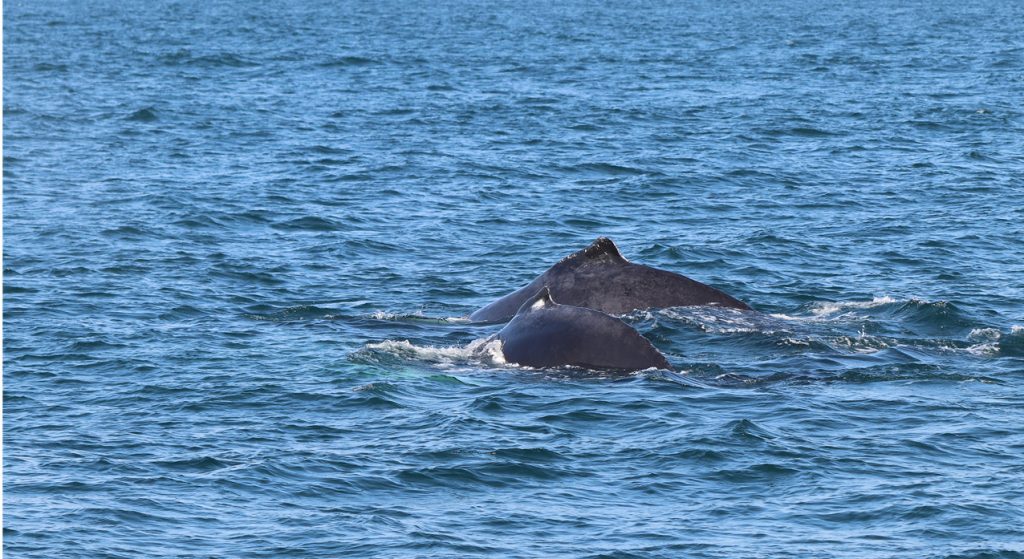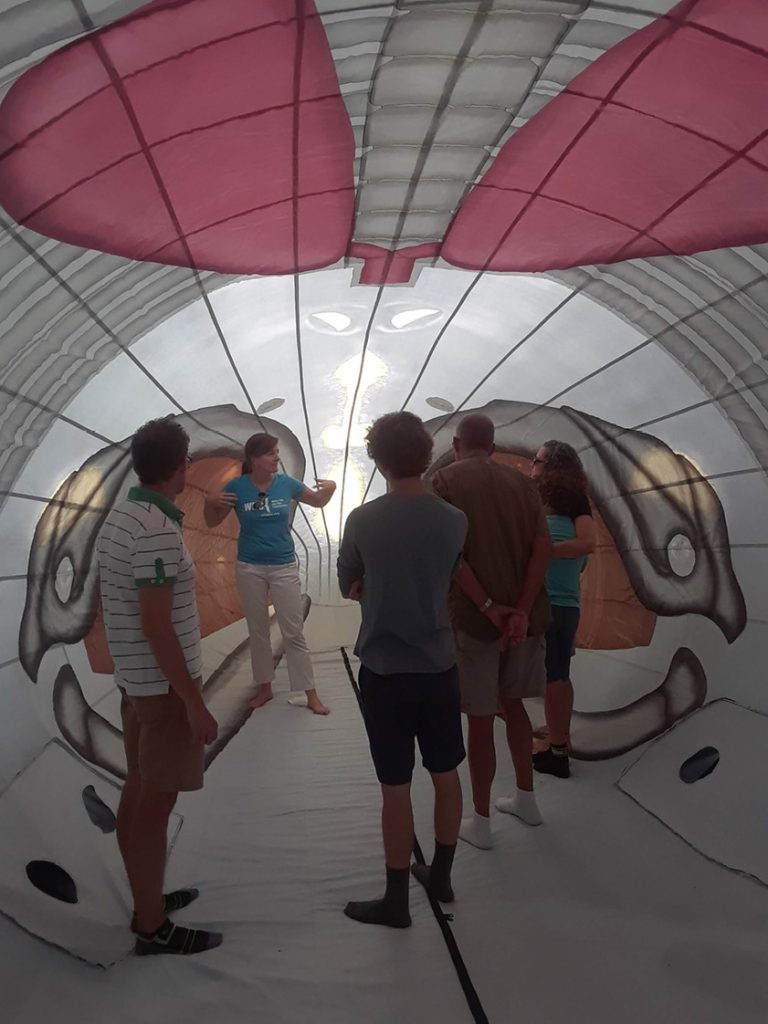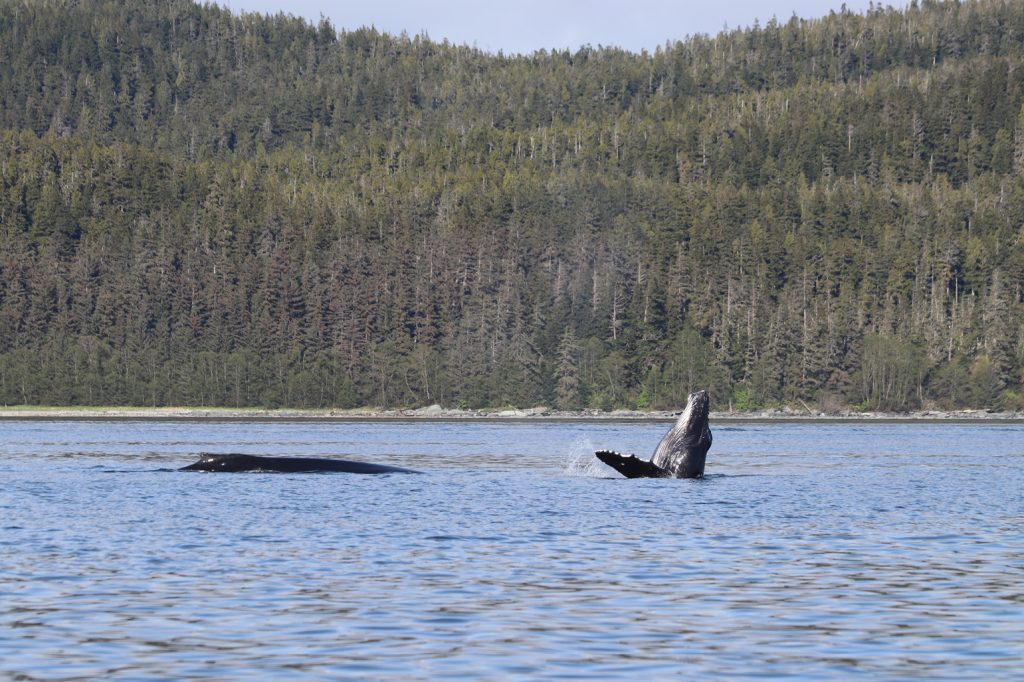By Monica Pepe, Whale and Dolphin Conservation Policy Manager,
Conservation and Education

Humpback mom and calf off Massachusetts, 2020 © Whale and Dolphin Conservation
As the tides have continued turning during this bizarre year we’re having, so too have the whales continued swimming. Whale and Dolphin Conservation has also persevered in our efforts to be a reliable source of news and resources, albeit in some very different avenues than we had planned.
If you visited us at the Connecticut Spring Boat Show last year at Safe Harbor Essex Island, you likely met Delilah, our life-size inflatable whale. She is typically the main attraction at our events, and while she already had a busy calendar lined up for 2020, she has been resting and patiently waiting at the WDC office until it’s safe to host more in-person events. In the meantime, we’ve been busy making sure people can continue learning about whales in fun and engaging ways. WDC’s website (whales.org) is now host to a suite of new materials that can be easily adapted for different learning environments.
As for the whales, life goes on even if we’re not there to see them. Many research teams have had to reduce or even cancel their planned survey efforts in order to comply with new safety protocols. Putting our egos aside though, the whales likely don’t miss us! Whales are found in all parts of the ocean, which means that we humans are always sharing their space, even in places where we least expect it, like the Gulf Coast of Florida where a North Atlantic right whale mom and calf spent a few weeks in March, or a New Jersey river where a humpback whale made its way in May. While it’s too early (and maybe impossible) to tell if whales are venturing to other new areas as a result of reduced boat traffic during the pandemic, researchers are able to listen to the changing sound levels underwater with less boat traffic to discover that it’s likely whales are able to communicate more easily.

Visitors inside Delilah, the inflatable whale © Whale and Dolphin Conservation
Think back to pre-pandemic days and picture yourself at a concert, movie, or generally in a large and loud crowd. In these environments, you tend to talk louder, right? Larger vessels, like cargo and cruise ships, tend to make a lot of noise. Even at a distance, ships can create a high volume of ‘white noise’ for acoustical creatures like whales, who sometimes communicate with each other across hundreds of miles. When you take a number of those noise contributors out of the picture, whales don’t have to “yell” to talk to each other. After the events of September 11, 2001, researchers actually detected a decrease in stress levels of North Atlantic right whales that coincided with the timeframe when shipping activity was restricted to regain a stronghold on U.S. security measures. It seems they were able to communicate and forage for food more easily during this time than they had for decades!
This year, a noticeable difference in noise levels is occurring in places like Glacier Bay, Alaska. The vast majority of tourists to Alaska arrive there by cruise ship, but you’ve likely realized that cruises have been practically non-existent in 2020. A recent NPR article shared research by Cornell University that determined the loudest underwater sounds this year were less than half as loud as two years ago. This also presents a new opportunity to listen to whales communicating in a more natural state – an exciting time for researchers!

Humpbacks in Alaska, 2019 © Whale and Dolphin Conservation
Boaters can help whales in a few key ways – regardless of whether we are dealing with a global pandemic! Safe operating guidelines exist in the Greater Atlantic (ME-VA) and following these guidelines will not only help to keep you, your passengers, and the whales safe, but will also reduce the noise impact you may be having on communicating whales. The guidelines include staying 100’ from whales and approaching and departing slowly – within a mile of a whale it’s recommended to reduce your speed to 10 knots. While this is primarily to avoid the chance of a dangerous collision, approaching and departing at a slower speed will make sure your engine is quieter when you are in close proximity, therefore creating less of a noise disturbance to whales.
These guidelines and more can be found at seeaspout.org. Additionally, you can keep a close eye out for any whales that appear to be entangled, injured, or dead, and report them to the U.S. Coast Guard via VHF Ch. 16, or to 866-755-6622 if you’re in cell phone range. Finally, boaters who travel in Massachusetts waters can help researchers better understand boating habits in coastal Massachusetts by completing a three-minute survey at bit.ly/massboaters. There’s even a prize entry for an Amazon gift card!
From all of us at WDC, we hope you are staying healthy and finding ways to safely get back out on the water! ■




